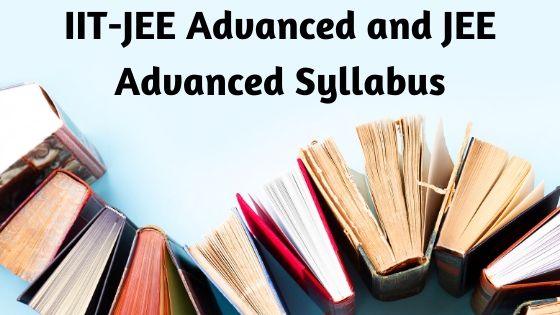A joint engineering entrance exam IIT-JEE is conducted in India for the students those who all are planning to study in IIT’s and NIT and various other colleges. It is one of the toughest entrance examination held in India.


What is the IIT-JEE Entrance?
Mainly it has two phases; IIT-JEE Main and IIT JEE Advanced. These two levels are the fence for the candidates to break for the successful completion of the examination. Candidates should pass the first phase IIT-JEE main and are then allowed for the second phase of the advanced exam.
IIT-JEE advanced is a national examination previously named as JEE advanced. This competitive examination is conducted to facilitate admission to IIT’s and many other colleges.
JEE Advanced Syllabus
The Jee advanced is one of the toughest competitive entrance examinations for the students who are seeking admission in the best colleges. JEE advanced syllabus helps students to cover all the important topics and concepts. It consists of sections of Physics, Chemistry and mathematics in a detailed version.
The subject list with topics of Physics, Chemistry and Mathematics is given below.
| Syllabus for Physics | ||
| General Physics | Units and Dimensions | Experimental analysis |
| 1. Mechanics | Laws of motion System of particles Harmonic motions The pressure in a fluid Inertia | Kinematics Gravitation Waves Thermal physics Momentum |
| 2. Electricity and magnetism | Magnetic field Electric current Electromagnetic induction | Electric field Capacitance |
| 3. Optics | Reflection Wave nature of light | Refraction |
| 4. Modern Physics | Atoms and Nuclei | |
| Syllabus for Chemistry | ||
| Physical Chemistry | ||
| Basic Concepts | Energetics | Solution |
| 1. Nuclear Chemistry 2. States of matter 3. Solid-state | Surface Chemistry Electro Chemistry Atomic Structure | Chemical bonding Chemical Equilibrium Chemical Kinetics |
| Inorganic Chemistry | ||
| 1. Ores 2. Extractive Metallurgy 3. Preparation of Non-metals | Minerals Properties of Non-Metals Preparation of Compounds | Transition Elements Qualitative analysis Properties of Compounds |
| Organic Chemistry | ||
| Basic Concepts | Properties, reactions and preparation of alkynes | Properties, reactions and preparation of alkenes |
| Phenols Ethers Carboxylic acid Practical Organic Chemistry | Reaction of benzene Aldehydes and ketones Carbohydrates Amino acids and Peptides | Alcohol Alkyl Halides Haloarenes Properties and uses of polymers |
| Syllabus for Maths | ||
| 1. Algebra | Quadratic Equations Logarithms Probability Binomial Theorem | Complex numbers Sequence and Series Matrices and Determinants Permutation and Combination |
| 2. Trigonometry | Trigonometric and inverse trigonometric functions | |
| 3. Vectors | Properties of Vectors | Derivatives |
| 4. Differential Calculus | Functions Limits | Derivatives Continuity |
| 5. Integral Calculus | Differential Equations | Integral and its Applications |
| 6. Analytical Geometry | 3-dimensional geometry | 2-dimensional geometry |
Each chapter consists of various questions and also referring the JEE advanced syllabus and making a basic knowledge of each concept from each chapter will make the students very easy those who are preparing for JEE exams.
Importance and Benefits of JEE Syllabus
- Easy learning of concepts with examples and questions
- Management of time and speed
- Enable to find the knowledge scale by practising the answering of questions after each chapter
- An idea of weightage of marks, question-answer samples is available in this syllabus.
























